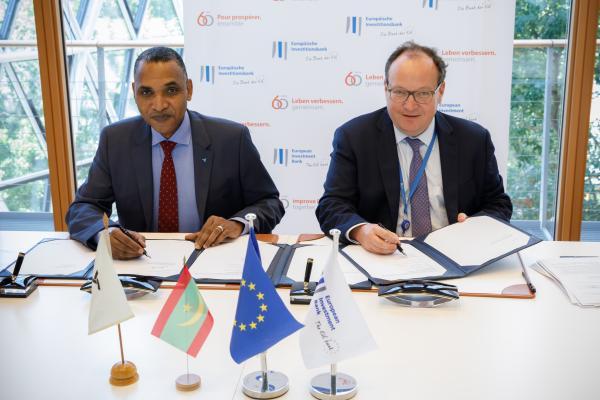
- The EIB and AfDB are providing USD 109m in financial support to SNIM.
- This financing is set to be used to deepen and widen the access channel to the Nouadhibou mineral port.
- By granting this support to Société nationale industrielle et minière (SNIM), Mauritania's second largest employer, the EIB and AfDB are helping to secure the economy and growth in the Sahel region.
The European Investment Bank (EIB – the EU bank) and the African Development Bank (AfDB) have concluded finance contracts of USD 59m and USD 50m respectively over 12 years with Société nationale industrielle et minière (SNIM), the largest mining company in Mauritania.
The funds are set to be used for the project to dredge SNIM's mineral port in order to expand the capacity of its port facilities in Nouadhibou, the economic capital of Mauritania located on its north-western Atlantic coast.
This large-scale financing will support a project with major social and economic impact, creating 94 full-time jobs during the construction phase together with 230 indirect positions. The SNIM Foundation will also benefit for its social activities in Mauritania.
The mineral port of Nouadhibou – the draught of which means that it cannot currently accommodate vessels exceeding 150 000 tonnes – is the shipping terminal used by SNIM to export its iron ore, giving it a key place in the Mauritanian economy. The ships that currently berth at the existing terminal only account for 6% of the global bulk carrier fleet, with their limited availability significantly increasing costs.
The project supported by the EIB and AfDB consists in deepening and widening 25 km of the SNIM mineral terminal's access channel with a draught making it possible to accommodate 230 000-tonne ships. This work will ultimately enable SNIM to increase the efficiency of its transport chain and improve its profitability, competitiveness and resilience on the international market in the face of fluctuations in global iron ore prices.
“This is large-scale, strategic financing for the development of the Nouadhibou mineral port. The project to extend port facilities will have a major social and economic impact for Mauritanians, creating numerous jobs,” said EIB Vice-President Ambroise Fayolle. “Supporting the development of tailored, effective and competitive infrastructure lies at the very heart of our activity in Africa, fully in line with the Cotonou Agreement objectives and the United Nations Sustainable Development Goals.”
AfDB (Africa's largest financing institution) has lent its support to this project, which is completely in line with two of its priority areas, namely industrialising Africa and improving the quality of life for the people of Africa. This AfDB assistance will make it possible not only to finalise the finance plan with the EIB, but also to bolster the financial resources of the SNIM Foundation for social projects: access to water, energy and healthcare infrastructure.
Abdu Mukhtar, Director of the AfDB Industrial and Mining department, commented: “Mauritania has the potential to become a major player in the global ore production sector. The channel work will enable SNIM to accommodate larger ships and thereby increase its exports to European and Asian markets. The African Development Bank is supporting industrialisation in Africa. The loan to SNIM is part of our bank's efforts to promote the responsible management of sustainable natural resources, the growth of this African industrial champion and the development of its infrastructure.”
“The mineral port dredging project is important for SNIM. It will enable us to make better use of the port facilities by loading 230 000-tonne ships,” said SNIM CEO Mohamed Salem Ould Bechir. “This project, which is part of SNIM's strategy to progressively expand its production capacity, also aims to improve the competitiveness of our products by cutting production costs and increasing the productivity of our facilities. Its impact on costs will therefore be substantial, particularly as a major share of the additional volumes will be destined for markets with high freight costs.”

Photographer: Mireia Gonzalez Torrijos ©EIB
Download original